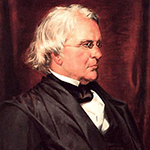
Robert Cooper Grier (1846-1870)
Lived from 1794 to 1870.
Early Life
Born in Harrisburg, Pennsylvania, Robert Cooper Grier received a classical education from his father, a grammar school teacher. In 1806, Grier’s his family moved to Northumberland, where his father was offered the opportunity to run a private academy. In 1811, Grier enrolled in Dickinson College as a junior, graduating one year later at the age of 18. Grier remained at Dickinson following graduation, working as an instructor before returning home to assist his father in running the academy. Recognizing his academic success, the academy appointed Grier its president at the young age of twenty.
Legal Career
While Grier’s legal education started under the guidance of his father, it was completed under the guidance of Charles Hall after his father’s passing in 1815. Following his admission to the bar in 1817, Grier moved to Danville where he opened his own practice. Shortly thereafter, Grier was appointed to a judicial post by Governor George Wolf. He maintained the position for 13 years.
Appointed to the Supreme Court
Grier was appointed to the Supreme Court of the United States in 1846 by President James K. Polk. During his tenure, Grier was best known for authoring opinions in Dred Scott v. Sandford and the Prize cases. In Dred Scott v. Sandford, Grier decided that slaves were property, not citizens, and were therefore unable to sue in federal court. In the Prize cases, the Court addressed President Lincoln’s use of blockades in the South before Congress had officially declared war on the Confederacy. Writing for the majority, Grier decided that the President had acted legally in his response to the Southern rebellion.
Death
In 1869, Grier’s health began to deteriorate, forcing him to retire from the Court. He died less than a year later at his home in Pennsylvania.
Notable Cases
Dred Scott v. Sandford (1857)
Prize Cases (1863)







